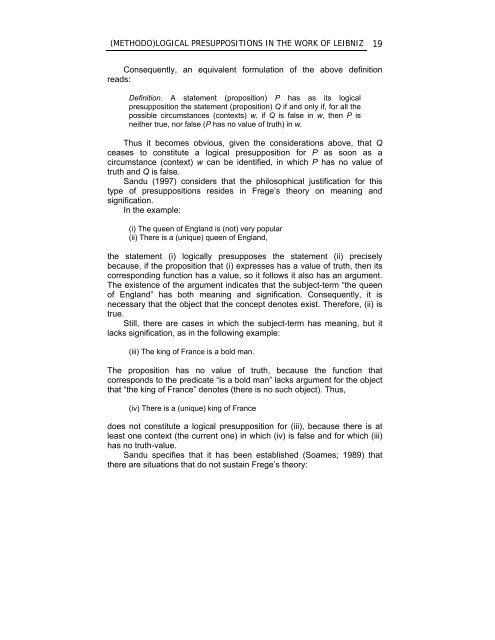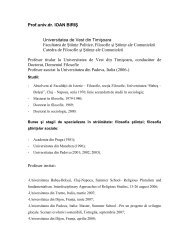analele universităţii de vest din timişoara annales universitatis ...
analele universităţii de vest din timişoara annales universitatis ...
analele universităţii de vest din timişoara annales universitatis ...
Create successful ePaper yourself
Turn your PDF publications into a flip-book with our unique Google optimized e-Paper software.
(METHODO)LOGICAL PRESUPPOSITIONS IN THE WORK OF LEIBNIZ 19<br />
Consequently, an equivalent formulation of the above <strong>de</strong>finition<br />
reads:<br />
Definition. A statement (proposition) P has as its logical<br />
presupposition the statement (proposition) Q if and only if, for all the<br />
possible circumstances (contexts) w, if Q is false in w, then P is<br />
neither true, nor false (P has no value of truth) in w.<br />
Thus it becomes obvious, given the consi<strong>de</strong>rations above, that Q<br />
ceases to constitute a logical presupposition for P as soon as a<br />
circumstance (context) w can be i<strong>de</strong>ntified, in which P has no value of<br />
truth and Q is false.<br />
Sandu (1997) consi<strong>de</strong>rs that the philosophical justification for this<br />
type of presuppositions resi<strong>de</strong>s in Frege’s theory on meaning and<br />
signification.<br />
In the example:<br />
(i) The queen of England is (not) very popular<br />
(ii) There is a (unique) queen of England,<br />
the statement (i) logically presupposes the statement (ii) precisely<br />
because, if the proposition that (i) expresses has a value of truth, then its<br />
correspon<strong>din</strong>g function has a value, so it follows it also has an argument.<br />
The existence of the argument indicates that the subject-term “the queen<br />
of England” has both meaning and signification. Consequently, it is<br />
necessary that the object that the concept <strong>de</strong>notes exist. Therefore, (ii) is<br />
true.<br />
Still, there are cases in which the subject-term has meaning, but it<br />
lacks signification, as in the following example:<br />
(iii) The king of France is a bold man.<br />
The proposition has no value of truth, because the function that<br />
corresponds to the predicate “is a bold man” lacks argument for the object<br />
that “the king of France” <strong>de</strong>notes (there is no such object). Thus,<br />
(iv) There is a (unique) king of France<br />
does not constitute a logical presupposition for (iii), because there is at<br />
least one context (the current one) in which (iv) is false and for which (iii)<br />
has no truth-value.<br />
Sandu specifies that it has been established (Soames; 1989) that<br />
there are situations that do not sustain Frege’s theory:




